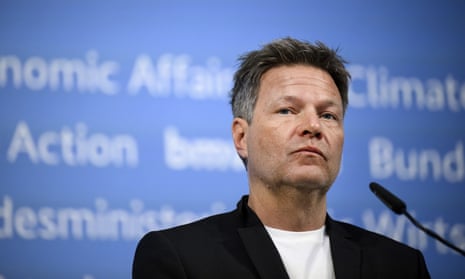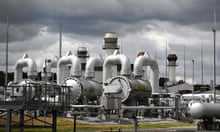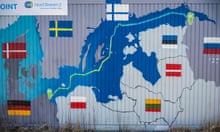Germany and Austria moved a step closer to gas rationing on Wednesday, after activating an emergency plan designed to help it cope with any disruption in supplies from Russia.
Amid fears of a looming showdown with Vladimir Putin over gas flows, Germany’s economy minister, Robert Habeck, convened a crisis team and warned consumers and businesses to reduce consumption, telling them “every kilowatt hour counts”.
As Europe’s largest economy, Germany is one of the EU members most reliant on supplies from Kremlin-controlled reserves, making it particularly vulnerable if the taps are turned off.
The EU has pledged to cut its use of Russian gas by two-thirds before the end of the year but there are concerns that the Kremlin could pre-empt the plan.
Putin has demanded that “unfriendly” countries pay for gas exports in roubles, a retaliation against the west for imposing crippling sanctions on Russia over its invasion of Ukraine.
“If you want gas, find roubles,” Vyacheslav Volodin, the speaker of the lower house of the Russian parliament, said on Wednesday.
G7 nations have so far rejected the demand, creating an impasse that has put Europe on alert for a gas supply crunch.
Habeck said he had activated the “early warning phase” of an existing gas emergency plan, meaning that a crisis team from the economics ministry, regulatory officials and the private sector will monitor imports and storage.
“We must increase precautionary measures to be prepared for an escalation on the part of Russia,” said Habeck. “With the declaration of the early warning level, a crisis team has convened.”
Habeck said supplies were safeguarded for the time being but urged consumers and companies to reduce consumption, saying that “every kilowatt hour counts”.
Austria, which is even more reliant on Russian gas than its larger neighbour, said it was implementing tighter monitoring of gas markets.
Germany’s DAX stock market fell nearly 1.5%, with major manufacturers such as Mercedes owner Daimler falling 2.6%, BMW down 2.9% and engineering firm Siemens finishing 3.3% lower.
If supplies fall short, Germany’s network regulator could ration gas, with industry being first in line for cuts. That threatens to send shock wave through Germany’s heavily industrialised, export-led economy, with sectors from automotive to chemicals highly reliant on flows of gas. Preferential treatment would be given to private households, hospitals and other critical institutions.
Half of Germany’s 41.5m households are heated by natural gas, while industrial users accounted for a third of the 100bn cubic metres of national demand in 2021.
Russia is Germany’s main gas supplier, accounting for 40% of imports in the first quarter of 2022. Berlin has pledged to end its energy dependency on Moscow but it will not achieve full independence before mid-2024, according to Habeck.
In France, the head of the energy regulator said the country should not encounter any supply issues and said there was no need to panic.
“Everything will be fine, the gas storage facilities are well filled, we’ll make it through the winter,” Jean-François Carenco, head of the CRE, told BFM TV.
Russia is also a major supplier of diesel to European countries. Diesel rationing is likely in Germany and could even happen in the UK, Amrita Sen, a founding partner and the chief oil analyst at the research consultancy Energy Aspects, told the Treasury committee earlier this month.









